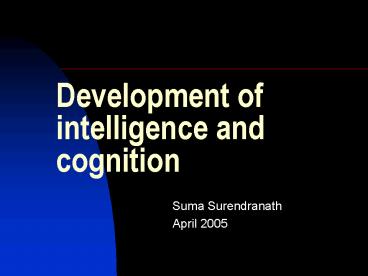Development of intelligence and cognition PowerPoint PPT Presentation
1 / 11
Title: Development of intelligence and cognition
1
Development of intelligence and cognition
- Suma Surendranath
- April 2005
2
What is intelligence?
- Defining intelligence easy or hard?
- What is valued or identified as intelligence?
- Ability to adapt flexibly and effectively to the
environment (Sternberg and Detterman, 1986)
3
How does intelligence develop?
- Piaget Shakespeare?
- Sequence of stages
- Sensory-motor (0-2 years)
- Pre-operational (2-6 years)
- Concrete-operational (7-11 years)
- Formal-operational (12 years plus)
4
What stimulates development?
- Functional invariants organisation and
adaptation - Assimilation vs accommodation
- Quest for equilbration leads to greater
understanding and knowledge
5
Criticisms of Piagets theory
- ?political legitimisation of imposed ideology
(Broughton, 1981) - Weaknesses of Piagets work
- No further development post formal-operational
stage - ?effect of wider community
6
Does intelligence change?
- Nature of intelligence
- g and s factors (Spearman, 1927)
- Fluid vs crystallised intelligence (Horn and
Cattell, 1967) - Decremental with compensation (Labouvie-Vief,
1977) - ?initial stages sow the seeds but experience and
active utilisation allow full bloom!
7
Role of society and context
- Subjective in terms of the group by which it is
being viewed (Warwick, 2000) - Individual cognitive structures lead to social
conventions - Knowledge gained by participation in the
community (Lave and Wenger, 1991) - Moral development by staged progression
(Kohlberg, 1969)
8
Conclusion
- Definition of intelligence dependent on many
variables - Likelihood of progressive changes in thinking
which is refined via experience and active
application - The society plays a vital role in the development
and active application of intelligence
9
References
- Beilin, H. (1992) Piagets enduring contribution
to developmental psychology. Developmental
Psychology, 28, 191-204. In Lourenqo, O. and
Machado, A. (1996) In defense of Piagets theory
a reply to 10 common criticisms. Psychological
Review, 103 (1) 143-164 - Bidell, T. R. and Fischer, K.W. (1992) Beyond the
stage debate action, structure and variability
in Piagetian theory and research. In R.J.
Sternberg and C.A. Berg (Eds) Intellectual
Development. Cambridge Cambridge University
Press - Boring, F.G. (1923) Intelligence as the tests
test it. New Republic, 35, 35-37. In R.J.
Sternberg (Ed) (2000) Handbook of Intelligence.
Cambridge Cambridge University Press - Broughton, J.M. (1981) Piagets structural
developmental psychology ideology, critique and
the possibility of a critical developmental
theory. Human Development, 24, 382-411. - Dasen, P. (1984) The cross-cultural study of
intelligence Piaget and the Baoule.
International Journal of Psychology, 19, 407-434.
In R.J Sternberg, G.B. Forsythe, J. Hedlund, J.A.
Horvath, R.K. Wagner, W.M. Williams, S.A. Snook
and E.L. Grigorenko (Eds) (2000) Practical
Intelligence in Everyday Life. Cambridge
Cambridge University Press
10
References (contd)
- Gardner, H. (1983) Frames of mind the theory of
multiple intelligences. New York Basic. In R.J
Sternberg, G.B. Forsythe, J. Hedlund, J.A.
Horvath, R.K. Wagner, W.M. Williams, S.A. Snook
and E.L. Grigorenko (Eds) (2000) Practical
Intelligence in Everyday Life. Cambridge
Cambridge University Press - Horn, J. and Cattell, R. (1967) Age differences
in fluid and crystallised intelligence. Acta
Psychologica, 26, 107-129 - Kohlberg, L.. (1971) From is to ought how to
commit the naturalistic fallacy and get away with
it. In T. Mischel (Ed) Cognitive Development and
Epistemology. New York Academic Press - Labouvie_Vief, G. (1977) Adult cognitive
development in search of alternative
interpretations. Merrill-Palmer Quarterly, 24 (4) - Lave, J. and Wenger, E. (1991) Situated learning
legitimate peripheral participation. Cambridge
Cambridge University Press - Piaget, J. (1973) The childs conception of the
world. London Paladin
11
References (contd)
- Spearman, C (1923) The nature of intelligence and
the principles of cognition (2nd ed.) London
Macmillan. In R.J Sternberg, G.B. Forsythe, J.
Hedlund, J.A. Horvath, R.K. Wagner, W.M.
Williams, S.A. Snook and E.L. Grigorenko (Eds)
(2000) Practical Intelligence in Everyday Life.
Cambridge Cambridge University Press - Sternberg, R.J. and Dettermen, D.K. (Eds) What is
intelligence? contemporary viewpoints on its
nature and definition. Norwood NJ Ablex. In In
R.J Sternberg, G.B. Forsythe, J. Hedlund, J.A.
Horvath, R.K. Wagner, W.M. Williams, S.A. Snook
and E.L. Grigorenko (Eds) (2000) Practical
Intelligence in Everyday Life. Cambridge
Cambridge University Press - Warwick, K. (2000) QI the quest for
intelligence. London Piatkus

